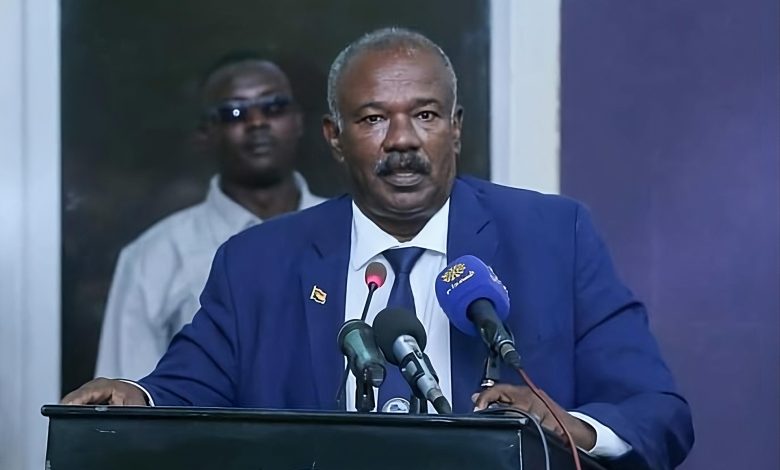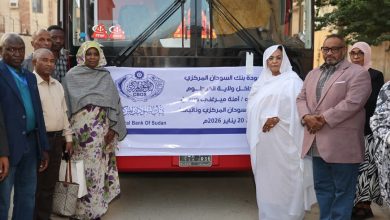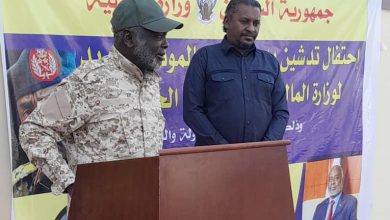Economic
Minister of Agriculture Dr. Abu Bakr Al-Bushra in an Interview with Al-Ahdath: “Sudan’s food situation is very reassuring, and corn production exceeds consumption needs”
"Export of cash crops continues unaffected by the war"

“Rapid Support Forces occupy half of the Gezira Project”
Interview by: Rehab Abdullah
Federal Minister of Agriculture, Dr. Abu Bakr Al-Bushra, gave reassuring updates about Sudan’s food security, confirming that the situation is very stable. He stated that corn production surpasses the country’s consumption needs, with over 39 million acres planted, including 17 million acres of corn, as it is a staple food for most Sudanese. This will provide 10 million tons of corn, while Sudan’s consumption needs are only 4-5 million tons.
The minister also revealed that the Rapid Support Forces (RSF) occupy half of the Gezira Project, but the other half remains under government control, where significant areas have been cultivated. He also discussed the impact of the war on foreign investments in Sudan and shared more details in the following interview.
There have been ongoing warnings from international organizations and humanitarian agencies about Sudan slipping into a severe food crisis, sometimes described as “famine.” While the Sudanese government, represented by the Ministry of Agriculture, has dismissed these warnings, there have been local reports of food shortages, particularly in Darfur. Could you clarify the facts with precise numbers, including production volumes, cultivated areas, and the country’s reserves?
Indeed, some organizations have warned that Sudan might face a severe food crisis, but fortunately, this summer season we cultivated over 39 million acres, including 17 million acres of corn. Corn is the main food for the Sudanese, so this ensures sufficient food supply. This cultivation will meet all our needs and exceed what is required. Sudan needs about 4-5 million tons of corn, and the 17 million acres of corn will provide over 10 million tons. Based on the harvest season and our visits to the states, the situation is very reassuring. We even invited the organizations that raised concerns to our harvest celebrations, and they were convinced that Sudan will not slip into a food crisis.
How much financing was provided for the summer season?
The General Manager of the Agricultural Bank stated that financing reached 41 trillion Sudanese pounds, which is more than last season. Of course, the Agricultural Bank cannot cover all farmers and areas, but this level of financing is sufficient for a significant percentage of small farmers and farming associations.
Sudan relies heavily on the Gezira Project for production. What is the current situation?
Sudan does not solely depend on the Gezira Project for crop production. There are other large national projects, such as Suki, New Halfa, and Rahad, which also contribute to production, along with large areas in various states. Currently, the RSF occupies nearly half of the Gezira Project, but the other half is under government management, and significant areas were cultivated this season. Additionally, Gezira is not just the project area; it is part of the wider Gezira state, where extensive farming took place this summer.
What are the preparations for the winter season?
The indicative plan is to cultivate 700,000 acres of wheat, distributed between Gezira, White Nile, and River Nile states. White Nile and River Nile can each provide 100,000-120,000 acres, while the Northern state will cultivate around 160,000 acres, and Halfa will contribute about 70,000 acres. We also plan to cultivate large quantities of vegetables and fruits.
What is the extent of the losses in the agricultural sector due to the war? Have they been assessed?
The war has certainly hindered agriculture, just like other sectors. However, we have managed to overcome many challenges. There have been significant losses, including the occupation of the Gezira Project, theft of seeds, stored crops, vehicles, and machinery.
What is the plan to rehabilitate what has been destroyed?
There is a rehabilitation plan for the Gezira Project and other projects affected by the war. We are currently developing this plan, which will be implemented once the war ends.
There have been complaints about the availability of fuel, bank financing, and the Salam pricing. How are you addressing these concerns?
We are very concerned about the farmers and prioritize providing inputs, even during the war. We managed to deliver fuel, seeds, and fertilizers to many states, except for those under occupation. We are also working on financing farmers through Salam contracts and are striving to solve the farmers’ problems, even though the country is in an exceptional situation.
What about cash crops like cotton, gum arabic, and peanuts? How is the export sector doing, and are there fears of Sudan losing its place in global markets?
In addition to corn and millet, large areas have been planted with cash crops such as sesame, peanuts, hibiscus, and watermelon seeds. Cotton was also planted, as we rely on exports. Thankfully, exports are continuing and have not been affected by the war.
What about pests threatening the season?
We have not experienced major pest attacks this season, though some areas saw a few incidents. We are swiftly responding with aerial spraying and have contracted companies and aircraft to combat these pests before they spread.
There are foreign investments in Sudan’s agriculture. What is the current status, particularly regarding the UAE’s Amtaar Project?
Foreign investments have indeed been affected by the war, as many of those overseeing these projects have left Sudan, abandoning the investments.
How is your relationship with the FAO?
We have a very strong relationship with the FAO, and they provide us with significant assistance. We rely on them as they have shifted from relief efforts to development. This season alone, the FAO donated 20,000 tons of improved seeds, which were distributed to farmers.
How is the coordination between your ministry, the Ministry of Finance, and the Ministry of Trade concerning decisions affecting the sector?
There is excellent coordination between the Ministry of Agriculture and the entire Sudanese government, particularly the Ministries of Finance and Trade. We work closely and operate as one team.



